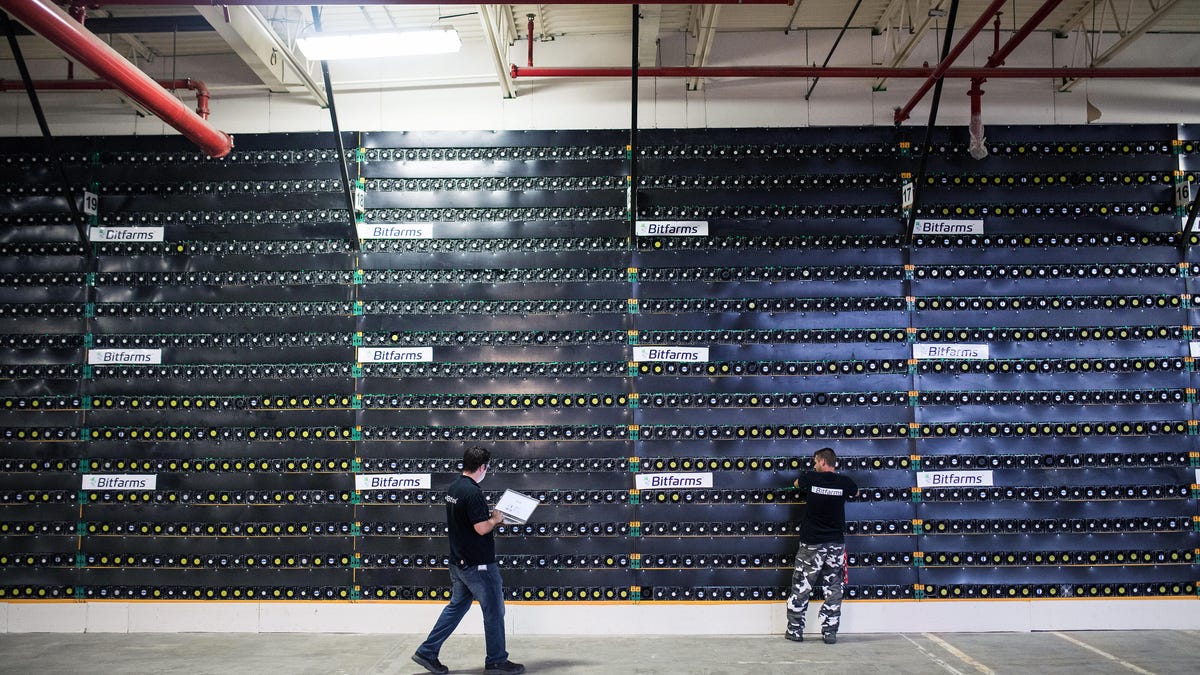Bitcoin's Environmental Threat Prompts Effort to 'Change the Code, Not the Climate'

A wall of crypto mining rigs.
What's happening
Environmental groups, led by Greenpeace and the Environmental Working Group, have launched a campaign calling for changes to the software behind bitcoin in order to make cryptocurrency network less energy intensive.
Why it matters
Bitcoin, the most popular of all cryptocurrencies, is an energy hog that is estimated to use as much energy every year as some countries, such as Norway and Sweden.
An alliance of environmental groups launched a campaign Monday to make bitcoin less energy intensive through changes to the software powering the cryptocurrency network.
Greenpeace USA, the Environmental Working Group and other organizations are calling for the bitcoin blockchain, the ledger that records transactions, to switch from its current proof-of-work system to a proof-of-stake model. Proof of stake is less energy intensive than proof of work.
The campaign, which uses the slogan "Change the code, not the climate," aims to highlight the amount of energy needed to power the network, an amount that has been estimated to be greater than that of many countries.
"It's better to have a thoughtful and managed change that reduces climate emissions as soon as possible, rather than some sort of calamity later," Greenpeace USA Campaign Director Rolf Skar said in an interview.
The campaign comes amid a boom in bitcoin mining operations in the US that's resuscitated business at coal plants, which belch out emissions that contribute to the climate crisis. US-based bitcoin mining has flourished since China banned the activity last year. The US has now replaced China as home to the most bitcoin mining operations.
"We're seeing frontline community fights proliferating around the US where fossil fuel power plants that were idle or were on their way to retirement suddenly have new customers in the form of bitcoin mining operations," Skar said.
The University of Cambridge's Bitcoin Electricity Consumption Index estimates bitcoin uses more energy each year than Norway and Sweden. The New York Times estimates bitcoin is responsible for one half of 1% of all global electricity use.
Bitcoin's proof-of-work model requires energy-sucking computer equipment to solve problems that validate transactions on the blockchain, a process known as mining. Miners are rewarded with coins when their machines complete the problems.
In proof-of-stake models, computers are randomly selected to create blocks for the blockchain. Computers that aren't selected are in charge of validating the blocks created. To be part of the proof-of-staking process, miners need to offer a certain amount of coins as collateral.
The Ethereum Foundation, which supports the ethereum blockchain, the native blockchain of ether, the second-largest cryptocurrency by market cap after bitcoin, has planned to change from proof of work to proof of stake for a while. The switch has been delayed but is still planned for the second quarter of 2022.
Some people, such as Sen. Ted Cruz, have advocated for coal-powered bitcoin mining. Cruz, a Texas Republican, has said he sees the mines as a way to support his state's power grid.
During a press call Tuesday, members of the campaign were quick to point out that the effort isn't anti-bitcoin and is focused on reducing the network's energy needs.

